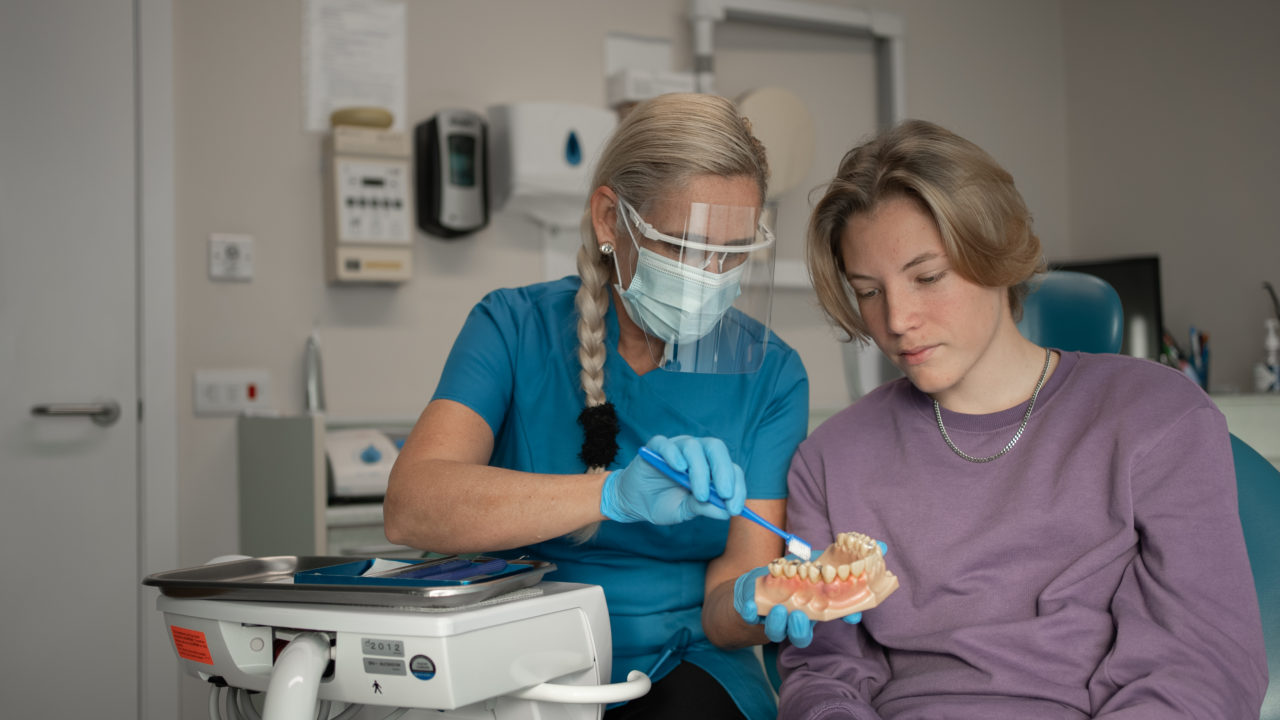
Brushing helps prevent tooth decay
Dental plaque is a soft sticky substance that builds up on your teeth. It is mostly made up of bacteria which feed on sugar from food and drink, producing acids as a waste product. The acids attack the teeth by dissolving the minerals in the tooth surface. If this happens too often teeth decay will occur as a result. For this reason, you shouldn’t have sugary food and drinks too often during the day.
Minerals in saliva can mend the teeth. If fluoride is present in the mouth, it helps teeth to repair themselves. Fluoride makes the bacteria less able to produce acid.
To remove plaque and help teeth to mend themselves, you need to brush twice a day with fluoride toothpaste.
Brushing helps prevent gum disease
You need to brush to stop plaque damaging your gums. If plaque is allowed to build up, the bacteria in it can make your gums sore and infected. Painless gum ‘pockets’ will start to form around the teeth – and bone supporting the teeth will slowly be lost. If unchecked, gum disease will lead to a loss of teeth.
How should I brush?
Brush your teeth thoroughly twice a day with a soft-to-medium brush and fluoride toothpaste. Replace the brush when the bristles get out of shape.
Put the bristles at the join between teeth and gums, pointing towards the gums, and brush using short circular movements.
Brush all around every tooth, carefully making sure you can feel the brush on your gums. Don’t use too much force – give your teeth and gums a gentle scrub. Thorough brushing takes two or three minutes; why not time yourself?
After brushing you should spit out the toothpaste – but do not rinse, as this lessens the effect of the fluoride.
Small children should only use a small, pea-sized amount of fluoride toothpaste. They cannot brush properly until they are at least six or seven so an adult should help them brush their teeth. One way is to stand behind the child and tilt their head back so all the teeth can be seen and reached.
Fluoride
Fluoride is a natural mineral that is very effective in protecting teeth against decay.
How does fluoride work?
Tooth decay begins with dental plaque, a soft, sticky substance that builds up on your teeth. Plaque is mostly made up of bacteria that feed on sugar from food and drink, producing acids as a waste product. The acids attack the teeth by dissolving the minerals in the tooth structure. If this happens too often teeth decay as a result.
Minerals in saliva can mend the teeth. If fluoride is present in the mouth, it helps teeth repair themselves.
And if fluoride is consumed in appropriate amounts by young children, it helps to make growing teeth more resistant to decay.
Fluoride in water supplies
In a few places, water supplies contain enough fluoride (one part per million) to keep teeth healthy. This can happen naturally or the amount of fluoride can be changed to make it right for teeth. In Britain, only one person in ten gets enough fluoride from the water supply.
Fluoride in toothpaste
Most people get fluoride from toothpaste. The toothpaste packs tell you how many parts per million (ppm) of fluoride the toothpaste contains. It might have a low fluoride level (less that 600ppm), a standard concentration (about 1000ppm) or a higher does (about 1500ppm).
The amount of fluoride you get in water or toothpaste is completely safe. If there is fluoride in your local water supply, you can still use fluoride toothpaste as well.
Up to the age of seven, while the permanent teeth are forming, consuming too much fluoride can produce unattractive marks on the teeth. To make sure this doesn’t happen, you should help children up to age seven to clean their teeth to make sure they do not eat the toothpaste and only use a small amount of toothpaste ( a pea size amount is recommended).
Low fluoride toothpastes are available for children; they should only be used by children who are at low risk of decay, drink fluoridated water, or are taking fluoride as tablets or drops. All children over six years of age should use toothpastes contain 1000 to 1500ppm.
For patents who already have a lot of decay, dentists may recommend extra fluoride, either as tablets or drops or as a varnish painted onto the teeth.
